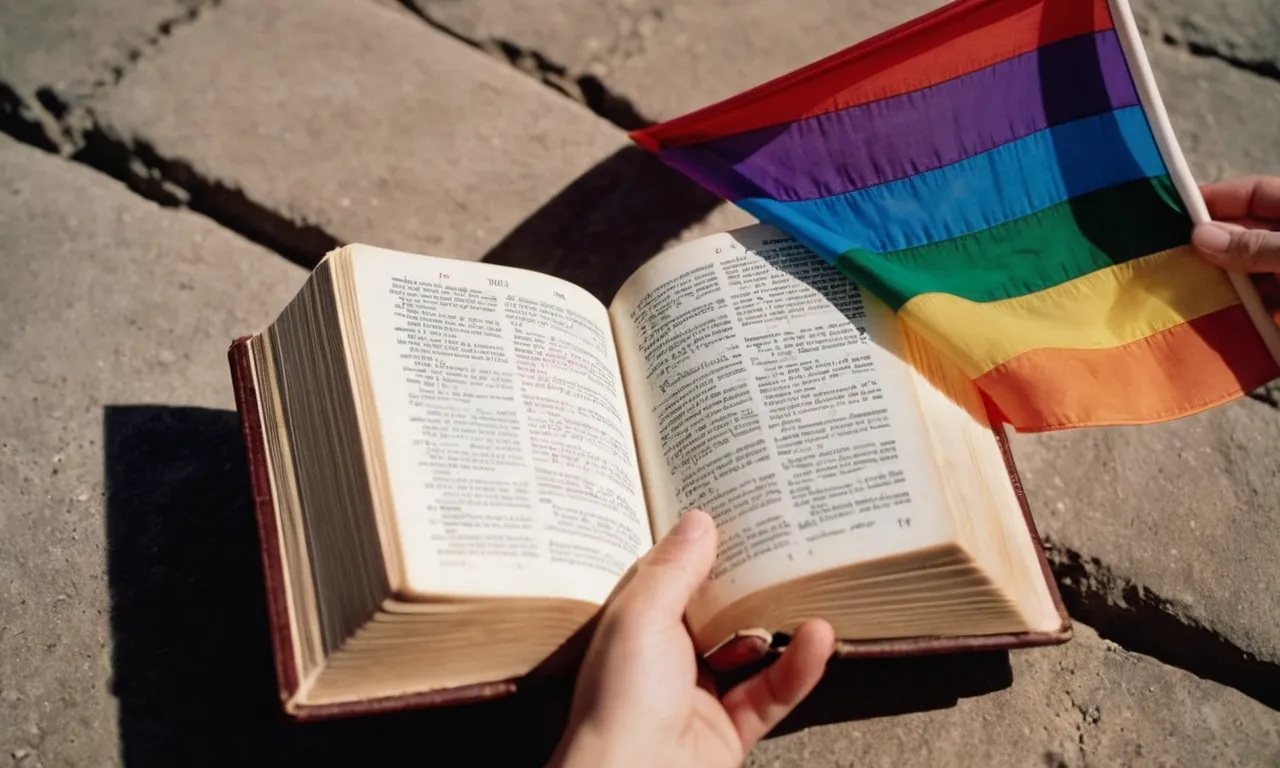What Does The Bible Say About Lgbtq?
The Bible’s perspective on LGBTQ identities and relationships remains a topic of ongoing theological debate. This article will summarize the key biblical passages referenced in these debates and the range of Christian viewpoints on them.
Key Biblical Passages
The Bible contains several passages that directly address homosexuality and same-sex relationships. Here are some of the most notable:
Genesis 19:1-11
This passage describes the destruction of Sodom and Gomorrah. The men of Sodom pursue sexual relations with angels who have taken the form of men. This passage has historically been interpreted as condemning homosexual behavior.
Leviticus 18:22 & 20:13
These verses state that “You shall not lie with a male as with a woman; it is an abomination.” This is one of the strongest condemnations of same-sex relations in the Old Testament.
Romans 1:26-27
The Apostle Paul condemns homosexual behavior in this New Testament passage, stating that “God gave them up to dishonorable passions. For their women exchanged natural relations for those that are contrary to nature; and the men likewise gave up natural relations with women and were consumed with passion for one another…”
1 Corinthians 6:9
This verse includes those who practice homosexuality in a list of unrighteous people who will not inherit the kingdom of God. The passage has historically been interpreted as rejecting homosexual behavior.
1 Timothy 1:9-10
This passage mentions those who practice homosexuality in a list of sins, along with murderers, slave traders, liars, and perjurers.
While these verses clearly condemn homosexual acts, the Bible is less clear on issues like same-sex marriage, gender identity, and loving committed same-sex relationships. There is debate within Christianity on how to apply these verses today.
Traditional Interpretations and Views
The traditional interpretations and views on LGBTQ issues in Christianity have largely been shaped by certain Bible passages that seem to condemn homosexual behavior. Here is an overview of some of the key traditional perspectives:
Old Testament Passages
There are a few Old Testament passages that have been traditionally interpreted as prohibitions against homosexual relations:
- The story of Sodom and Gomorrah in Genesis 19, where the men of Sodom demand to have sexual relations with Lot’s angel visitors. This story has been seen as an example of God’s condemnation of homosexual acts.
- Leviticus 18:22 and 20:13 state that it is an “abomination” for a man to lie with a man as with a woman.
These passages have led to traditional interpretations that the Old Testament condemns homosexual relations as sinful.
New Testament Passages
In the New Testament, there are also a few passages that have shaped traditional views:
- Romans 1:26-27 describes homosexual relations as “unnatural” and “shameless.”
- 1 Corinthians 6:9-10 includes “homosexual offenders” in a list of people who will not inherit the kingdom of God.
- 1 Timothy 1:10 lists “homosexuals” among the lawless and disobedient.
These passages have led many Christians to believe the New Testament upholds and even strengthens the Old Testament prohibitions against homosexual behavior.
Church Teachings Over History
Based on these biblical passages, historical Christian tradition has overwhelmingly condemned homosexual behavior for centuries. Some examples:
- The Didache, an early Christian text (1st/2nd century), prohibited pederasty and sex with youths.
- In the Middle Ages, homosexuality was considered a serious sin and even a crime.
- Thomas Aquinas called homosexual acts “unnatural” based on natural law theory.
- Most Protestant Reformers, including Martin Luther and John Calvin, condemned homosexual acts.
- The Catholic Church has consistently prohibited homosexual activity and gay marriage.
So the traditional views have emphasized prohibitions against homosexual behavior throughout most of church history.
Summary of Traditional Views
- Condemn homosexual acts as sinful based on certain biblical passages.
- Prohibit gay marriage and view it as immoral.
- Emphasize Change and celibacy for those with homosexual orientation.
- Reject transgender identities as unbiblical and problematic.
However, there are diverse perspectives emerging as some Christians re-examine these issues. This traditional outlook continues to shift as understandings evolve.
Affirming Interpretations and Views
In recent years, there has been a growing movement among some Christian denominations and believers to adopt more affirming views toward LGBTQ people and relationships. Here are some of the key arguments made by those advocating for affirming interpretations of the Bible’s teachings on these matters:
Focus on Passages Concerning Loving Others
Affirming Christians emphasize biblical passages that promote love, compassion, and acceptance, such as Jesus’s commandment to “love your neighbor as yourself” (Mark 12:31). They argue that LGBTQ people should be fully included in the Christian community and treated with dignity, respect, and love.
Question Traditional Interpretations
Affirming Christians question traditional interpretations of the “clobber passages” – biblical texts often cited as condemning same-sex relations, such as Leviticus 18:22 and Romans 1:26-27. They argue these passages refer to specific contexts, such as temple prostitution, and do not address loving, committed same-sex relationships as understood today.
Highlight Examples of Diversity in the Bible
Affirming Christians point to examples of gender and sexual diversity that appear positively or neutrally in the Bible, such as Ruth and Naomi, the Ethiopian eunuch (Acts 8), and David and Jonathan’s intimate friendship.
They argue these examples show the Bible allows for diversity in gender expression and relationships.
Emphasize Spiritual Fruits Over Sexual Ethics
Affirming Christians tend to place greater emphasis on whether a relationship bears good spiritual fruits in people’s lives rather than focusing solely on sexual ethics. They believe same-sex couples can reflect the love of Christ just as well as opposite-sex couples.
Appeal to New Understandings
Affirming Christians believe new historical understandings and scientific evidence regarding human sexuality should inform biblical interpretation. They reject the idea that the Bible definitively condemns all same-sex relationships as anachronistic.
Debates and Disagreements
The topic of LGBTQ identities and relationships has sparked much debate and disagreement among Christians. There are several key areas of contention:
Same-Sex Relationships
Perhaps the biggest source of debate is around the issue of same-sex romantic and sexual relationships. Some Christians believe the Bible clearly prohibits all same-sex relations, pointing to verses like Leviticus 18:22 and Romans 1:26-27.
Others argue these verses are taken out of context or reflect cultural biases of the time. More progressive Christians believe committed same-sex relationships can be affirmed based on the overall message of love and acceptance in the Bible.
Gender Identity
Another area of disagreement is around transgender and non-binary identities. Traditionalists tend to view gender as binary and God-given, making any transitions or fluidity unacceptable. More inclusive Christians argue for acceptance based on every person being created in God’s image.
They cite verses about God’s love for all people such as John 3:16 and Galatians 3:28.
Ordination and Leadership
Many denominations have faced divisions over the ordination of LGBTQ people and allowing them to hold leadership positions. Conservatives believe leadership should be reserved for those who adhere to traditional biblical standards of sexuality and gender.
Progressives push back against what they see as discrimination, arguing that leadership should be based on calling and competence rather than identity.
The Clobber Passages
There is extensive theological wrangling around the “clobber passages” – a handful of verses often cited to condemn LGBTQ people. Both sides argue over issues like translation, cultural context, and consistency with Christ’s overall message. This exegetical wrestling fuels many aspects of the debate.
The Authority of Scripture
Undergirding the entire discussion is the question of biblical authority. Conservatives see the Bible as the inerrant word of God that unequivocally condemns LGBTQ relations. Liberals argue for reading Scripture in historical context, believing later understanding can supersede parts of the Bible.
This is a complex issue with sincere believers on each side. Continued prayer, dialogue and the guidance of the Holy Spirit are needed to bridge divides and discern God’s heart for LGBTQ people.
Conclusion
There is a diversity of viewpoints among Christians on LGBTQ issues and how to interpret the key biblical texts. This is an important conversation within faith communities. Above all, we must approach these complex issues with compassion.








